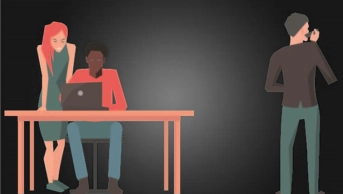
Alamy Stock Photo / Mint Images Limited
The problem
You are a pharmacist who sometimes completes evening locum shifts in a small, extended-hours pharmacy. You are often required to work alone during the last hour of this shift. The pharmacy is in a quiet neighbourhood and there have been times when you have been concerned about your personal safety, especially during winter when it gets dark before the end of your shift.
As a locum, how should you manage this situation and communicate your concerns to your employer?

Source: Bhavisha Patel
“Ask what measures they have in place to reduce the risks, such as CCTV”
Address having to work alone and ask if it is possible for a member of staff to be paid to work the extra hour — this may be unlikely due to budget restraints — or enquire if a member of staff would be happy to start their shift an hour later so there is someone present until the store closes. This may not be something that the employer is able to facilitate, but there is no harm in asking.
Ask what measures the pharmacy has in place to reduce the risks associated with lone working, such as CCTV cameras. On the other hand, this could be an opportunity to put forward an idea that hasn’t yet been implemented, such as restricting access to the pharmacy or serving from a hatch during this time.
It would also be wise to consider how lone working impacts the commute home. I would consider getting a personal alarm if I had to park my car far away from the pharmacy or on an unlit street, or if I had to walk or rely on public transport to get home.
Supermarket pharmacies have largely been the environments where I have worked on my own. To minimise risk, I have parked close to the store’s entrance so it is a quick walk to my car. It is wise to find out beforehand who you will be working with and what time they finish their shift. If there is a security guard on site, I have introduced myself and informed them that I’ll be working that evening and what time I’ll be dropping the keys off. I would also send messages to my family telling them what time I expect to leave and send another message when I do actually leave so they know when to expect me home.
I also have the ‘Find My Friends’ mobile app, which can be used to track my phone in the event that it is misplaced, but it is a way for loved ones to check in on me and see where I am.
Bhavisha Patel is a part-time locum pharmacist and part-time pharmacy manager at Day Lewis Pharmacy, Berkshire

Source: jonathan clarke
“Outline your concerns on personal safety and suggest ways of addressing these”
Before having any discussion with the pharmacy manager or superintendent, do some pre-reading on available material, such as:
- The locum professional indemnity insurance policy — does insurance cover you as a lone worker? If not, you could be working uninsured;
- The pharmacy’s standard operating procedures (SOPs) — What do the pharmacy’s SOPs say about lone working? Are the SOPs available for you to read? Are they amended if another member of staff is not involved in the dispensing process?
- The pharmacy’s lone-working policy — does the pharmacy have one in place and does it include a complete risk assessment for lone workers?
Once you have read these, organise an informal meeting or phone call to discuss your findings with the pharmacy owner. During the meeting, outline your concerns on personal safety and suggest ways of addressing these. These could include:
- The creation of a lone-worker policy, including practical advice on how to work alone safely;
- The creation of a lone-worker risk assessment, including the unique risks potentially faced while working alone and the steps required to minimise these;
- Requesting that the pharmacy invests in technology such as personal protection alarms, CCTV and adequate street lighting;
- Requesting staff training, such as how to deal with unexpected circumstances and self-defence;
- The creation of set communication channels, for example, organise a phone call with the pharmacy owner at locking-up time to ensure everything is fine. Alternatively, organise a call from a friend or family member who expects you to be home a certain amount of time after the shift ends.
I would hope that, at the completion of the meeting, your concerns would be satisfied. However, if this is not possible, you should initiate a discussion around having an extra member of staff present for the last hour of the shift.
Jonathon Clarke is a pharmacist and chief executive of Locate a Locum

Source: Lee Jefcott
“The law requires employers to carefully consider the risks to health, safety and welfare of workers required to work alone.”
Employers are responsible for the health, safety and welfare of their workers, including freelance workers such as locum pharmacists. While lone working is not in itself against the law, the law requires employers to carefully consider any risks to the health, safety and welfare of workers who are required to work alone. However, it is doubtful whether this duty extends to issues of personal safety after leaving work.
If you are concerned about personal safety in travelling home, you could raise this with your employer and ask, for example, whether they would be willing to pay for a taxi or arrange transport — although it is rare for employers to do this unless working particularly late or unsocial hours.
You could also discuss with your employer whether it is possible to vary your hours to avoid leaving work when it is dark. Employees who have more than 26 weeks’ service have the right to apply for flexible working. While the employer is not duty bound to accept the request, they must at least consider whether it can accommodate the request. However, this may not be possible for locums working irregular shifts and does not consider the contractual hours of a pharmacy.
Lee Jeffcott is partner in the employment law team at Brabners LLP in Manchester

Source: Rachel Quinlan
“Assess the risks to your personal safety and those of people using your services”
Pharmacists may occasionally find themselves working alone in a pharmacy. This can leave members of staff feeling vulnerable and in an unsafe position. If faced with this situation, assess the risks to your personal safety and those of people using your services. Some of the options available to pharmacists in this situation could be:
- Check the SOPs to see if lone working is covered; if there is no alternative, processes for ensuring your personal safety should be in place;
- Speak to the manager or superintendent pharmacist and express your concerns, particularly explaining that you feel concerned about your personal safety. When possible, this should be done before the shift in order to allow the manager or superintendent to take action;
- Offer possible solutions — perhaps a member of staff could start later or work a split shift to ensure that there are always two people in the pharmacy;
- If you have a mentor, you could discuss your options with them, they may have experience of similar situations and be able to offer additional advice;
- Speak to your indemnity insurance provider to find out what they advise and how this impacts your cover.
The Royal Pharmaceutical Society’s Responsible Pharmacist guidance states: “If you believe a pharmacy is not safe or patients are at risk then you’ll need to take steps to secure the safe and effective running of the pharmacy. It could help to speak to the pharmacy owner or superintendent. If it is not possible to secure safety and effectiveness, then the pharmacy should be closed.”
Closing a pharmacy would be the last resort, and if you feel the need to do this, you should advise your local NHS organisation and local surgeries.
For more information, contact the Royal Pharmaceutical Society’s professional support service on 0207 572 2737 (Monday to Friday, 09:00–17:00) or at support@rpharms.com; or contact Pharmacist Support on 0808 168 2233 or at info@pharmacistsupport.org.
Rachel Quinlan is a professional support pharmacist at the Royal Pharmaceutical Society



